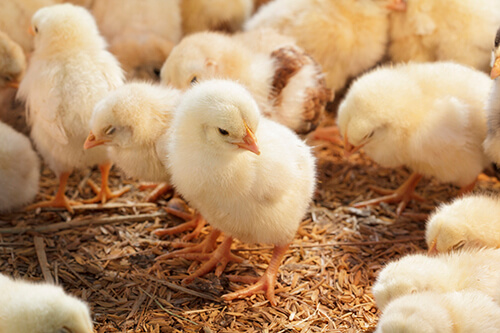Care and brooding of baby chicks
Feb 17, 2020

Raising and owning chickens can be a family fun affair. It is approaching the time of year when our Co-ops are filled with baby chicks awaiting their new home, but there are a few things to know before picking yours up.
You must start by creating a draft- and rodent-free area for your brooder box. It is very important that the chickens’ brooder stay at 95 degrees Fahrenheit for the first 10 days you have them home. From there, decrease the temperature five degrees each week thereafter. After six weeks, keep your birds in about 70-degree weather if possible. In order to do this, the most common heat lamp used is the four-bulb, 250-watt brooder lamp. These lamps are adequate for 300 baby chicks, but will do just fine on any number below that.
When decreasing the temperature, consider the behavior of your chicks at all times. You will be able to tell on sight if the chicks are warm enough. If they’re too hot, they’ll spread their wings. If chicks are cold, they will pile up. If the chicks are moving around, they are at a comfortable temperature. A barrier should be placed around the heat lamps to keep the chicks near the heat.
When it comes to bedding, always provide 2 to 4 inches of suitable dry litter such as shavings or straw. Avoid slick surfaces such as newspaper, which can cause serious leg problems later on in the chick’s life.
Chicks must have fresh feed and clean water at all times and a high-quality medicated starter feed for the first six to eight weeks before changing to a chick grower feed. It is a good idea to scatter fine cracked corn or fine grit on top of the feed for the first two to three days. This will assure a better start for the chick’s digestive system. Co-op recommends two 1-gallon water fountains and two 24-inch feeders for each 100 chicks. As the chickens age, you will want to use larger feeders and waterers.
While it is helpful to have a basic understanding of chicken behavior before owning them, chickens, like people, have their own personalities, likes, dislikes, desirable and undesirable habits. Establishing a routine and order with your flock will help bring the best harmony for you and your newfound friends. For more information about chick care, visit your local Co-op.
You must start by creating a draft- and rodent-free area for your brooder box. It is very important that the chickens’ brooder stay at 95 degrees Fahrenheit for the first 10 days you have them home. From there, decrease the temperature five degrees each week thereafter. After six weeks, keep your birds in about 70-degree weather if possible. In order to do this, the most common heat lamp used is the four-bulb, 250-watt brooder lamp. These lamps are adequate for 300 baby chicks, but will do just fine on any number below that.
When decreasing the temperature, consider the behavior of your chicks at all times. You will be able to tell on sight if the chicks are warm enough. If they’re too hot, they’ll spread their wings. If chicks are cold, they will pile up. If the chicks are moving around, they are at a comfortable temperature. A barrier should be placed around the heat lamps to keep the chicks near the heat.
When it comes to bedding, always provide 2 to 4 inches of suitable dry litter such as shavings or straw. Avoid slick surfaces such as newspaper, which can cause serious leg problems later on in the chick’s life.
Chicks must have fresh feed and clean water at all times and a high-quality medicated starter feed for the first six to eight weeks before changing to a chick grower feed. It is a good idea to scatter fine cracked corn or fine grit on top of the feed for the first two to three days. This will assure a better start for the chick’s digestive system. Co-op recommends two 1-gallon water fountains and two 24-inch feeders for each 100 chicks. As the chickens age, you will want to use larger feeders and waterers.
While it is helpful to have a basic understanding of chicken behavior before owning them, chickens, like people, have their own personalities, likes, dislikes, desirable and undesirable habits. Establishing a routine and order with your flock will help bring the best harmony for you and your newfound friends. For more information about chick care, visit your local Co-op.